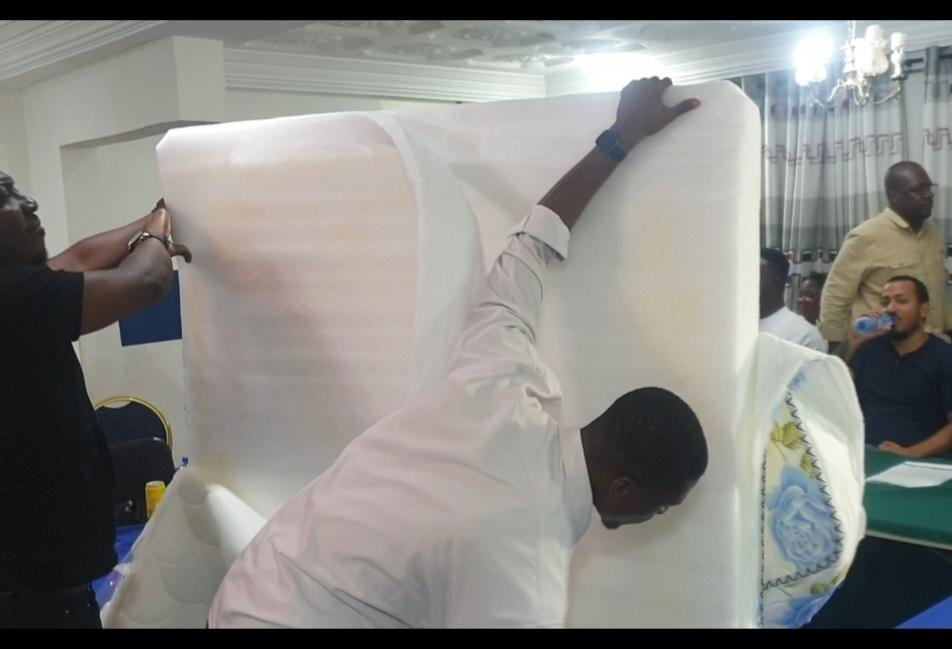News
Make family planning centres, antenatal clinics adolescent friendly

Stigmatisation and judgmental attitudes from some health workers have been identified as some of the factors that discourages young people from accessing care.
The interim Country Director of Right to Play Ghana, Mr Evans Sinkari, has, therefore, urged family planning centres to be more welcoming and inclusive to adolescents seeking reproductive health services.
“Young people are among the most vulnerable when it comes to reproductive health, yet they face the greatest barriers to accessing services,” he said.
In an interview with The Spectator, Mr Sinkari explained that adolescents, aged 10 to 19, were at risk of unintended pregnancies, unsafe abortions, and sexually transmitted infections due to limited access to information and services.
He stated that many were sexually active, whether by choice, coercion, or early marriage—yet often lacked adequate knowledge of, or access to contraception.
He emphasised that health workers’ judgmental attitudes, coupled with lack of privacy and confidentiality, often shame adolescents, deterring them from seeking contraceptives.
The fear that parents or community members may discover their choices further discourages them, he noted, and added that unfriendly environments at health facilities largely designed for adults, created feelings of intimidation, while financial and social barriers limit adolescents’ decision-making power and ability to pay for care.
According to Mr Sinkari, accessible and youth-friendly family planning centres would help reduce adolescent pregnancies and associated risks.
Contraceptive access, he stressed, prevents unsafe abortions, a leading cause of maternal mortality among adolescents.
He noted that promoting health and education would also reduce unintended pregnancies, allowing young people to remain in school and realise their potential.
On adolescent pregnancy, he noted that some health workers stigmatised young mothers when they sought antenatal care.
He emphasised the need for compassion, dignity, and professionalism in treating adolescent pregnant girls, arguing that stigmatisation undermined their rights and Ghana’s public health goals.
“It is not right for health workers in Ghana or anywhere to undermine adolescent girls,” he indicated, warning that such attitudes discouraged antenatal visits, skilled delivery, and postnatal care.
Some young mothers, fearing mistreatment, turn to unsafe abortions or unqualified traditional attendants, putting their lives at risk.
“These psychological harms lead to poor maternal and child outcomes, including preterm births, low birth weight, neonatal complications, and reduced uptake of postnatal services such as child immunisation and nutrition,” he explained.
Additionally, he cautioned that negative attitudes by health professionals perpetuate a cycle of harm, discouraging care-seeking, worsening health outcomes, increasing stigma, and undermining Ghana’s health and development goals.
Citing the 1992 Constitution and international agreements ratified by Ghana, such as the UN Convention on the Rights of the Child and the African Charter on the Rights and Welfare of the Child, he stressed that all adolescents have the right to quality, non-discriminatory healthcare.
Moreover, Mr Sinkari called for full implementation of Ghana’s Adolescent Health Services Policy and the National Reproductive Health Services Policy, which emphasise creating safe, supportive, and youth-friendly health services.
He said adolescent reproductive health must be a national priority, urging the establishment of more adolescent-friendly clinics across the country to provide education, reduce stigma, and help Ghana achieve SDG 3 on health and SDG 5 on gender equality.
From Ama Tekyiwaa Ampadu Agyeman, Koforidua
Join our WhatsApp Channel now!
https://whatsapp.com/channel/0029VbBElzjInlqHhl1aTU27
News
Watch your mattresses!…they can cause chronic back pain, other health disorders

Local mattress manufacturers have raised serious concerns over the influx of substandard mattresses, warning that these products pose significant health risks to consumers and threaten the sustainability of Ghana’s mattress industry.
At a press briefing held in Kumasi on Tuesday, manufacturers accused unregistered foreign entities, particularly Chinese firms, of flooding the market with cheap mattresses made from polystyrene.
Mr Yaw Ampem Darko, a spokesperson for the local manufacturers, warned that prolonged use of substandard mattresses, especially those made with polystyrene, could result in chronic back pain, musculoskeletal disorders, poor posture, and diminished sleep quality.
These health implications, they stressed, were not always immediately evident but accumulate over time, especially among vulnerable populations such as children and the elderly.
This material, typically used for packaging, is considered unsuitable and unsafe for bedding.
According to industry leaders, these sub-standard products have been circulating for at least five years, gaining traction among unsuspecting consumers due to their unusually low prices.
“These mattresses are being sold at suspiciously low prices, luring unsuspecting consumers who are unaware of the health dangers.”
“We are not just protecting our businesses; we are protecting Ghanaian lives. The government must act swiftly to stem this tide before more citizens fall victim to these dangerous products,” Mr Yaw Ampem Darko stated.
The Ghana Standards Authority (GSA) has acknowledged the issue and, in response, announced a nationwide enforcement campaign aimed at clamping down on the production, distribution, and sale of substandard mattresses.
The campaign, which was scheduled to take effect from September 30, 2025, was empowered by the GSA Act, 2022 (Act 1078), which authorises the Authority to seize and seal non-compliant products and impose sanctions on offenders.
In a statement signed by the Director General of the GSA, Professor George Agyei, the authority cited Sections 29 and 43 of the Act, reiterating that all mattresses sold in Ghana must meet established national standards or face confiscation.
The statement further emphasised that mattresses failing to meet these standards not only compromise sleep quality but also contribute to long-term health complications, including spinal and neck pain.
Despite the GSA’s commitment, manufacturers have expressed frustration over delays in implementation and called for stronger enforcement mechanisms.
They urged the GSA to work in close collaboration with the Customs Division of the Ghana Revenue Authority and national law enforcement agencies to identify and prosecute violators of Ghana’s quality standards.
Manufacturers are also appealing to consumers to remain vigilant and prioritise their health by verifying that any mattress they purchase bears the GSA certification mark.
Moreover, they caution the public against purchasing suspiciously cheap mattresses that lack proper labelling or identifiable branding, as these were often indicators of substandard or counterfeit products.
As the official enforcement deadline had expired with no show, the local producers insisted that much more than business interests were at stake.
They argued that without swift and sustained action, the health and safety of Ghanaian consumers would continue to be compromised.
“Public awareness, strict enforcement, and collaboration among regulatory bodies are essential if we are to protect the integrity of the local industry and the wellbeing of the Ghanaian people,” Mr Darko indicated.
From Kingsley E. Hope, Kumasi
Join our WhatsApp Channel now!
https://whatsapp.com/channel/0029VbBElzjInlqHhl1aTU27
News
Raissa Initiative demands harsher punishment for sexual abusers of girls

The Founder of the Raissa Child Protection Initiative, Ms Raissa Sambou, has urged authorities to impose severe punishment on individuals, including teachers and guardians, who sexually abuse young girls.
Speaking in an interview to mark this year’s International Day of the Girl Child (October 11), Ms Sambou condemned the increasing cases of sexual exploitation involving minors, describing such acts as “heartless, criminal, and a total betrayal of trust.”
She noted that those entrusted with the care and education of children must not be the same people who violate them, stressing that “anyone found guilty of abusing a girl child must face the full rigours of the law without leniency.”
The International Day of the Girl Child is observed annually to promote the rights of girls, empower them to reach their full potential, and draw attention to the challenges they face worldwide.
Ms Sambou lamented that poverty continues to push many young girls into vulnerable situations, exposing them to exploitation.
She expressed concern that some headmasters, teachers, and community members who should protect girls rather take advantage of them.
“This must stop immediately. The safety of every girl must never be compromised,” she said, urging the public to report all forms of abuse to the appropriate authorities and called for swift action by law enforcement agencies against perpetrators.
Addressing girls directly, Ms Sambou encouraged them to take their education seriously and to believe in their potential.
“It is possible to be young and responsible. Your future is bright, protect it, believe in it, and never let anyone dim your light,” she advised.
She further urged girls to choose their friends wisely, stay disciplined, and speak up if anyone makes sexual advances toward them.
Ms Sambou concluded with a rallying call for collective action, saying “speak up, protect them, and empower them. Together, we can end the sexual exploitation of girls.”
By Esinam Jemima Kuatsinu
Join our WhatsApp Channel now!
https://whatsapp.com/channel/0029VbBElzjInlqHhl1aTU27














